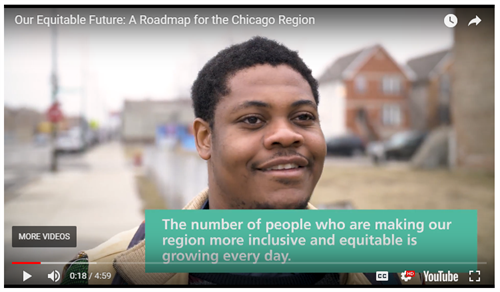
Storycatchers Theatre's Changing Voices Ensemble members performed "Redirecting the Pipeline"
 By Sawyer Middeleer, Research Assistant
By Sawyer Middeleer, Research Assistant - May 18, 2018
On Tuesday, May 15, the Metropolitan Planning Council announced the release of Our Equitable Future: A Roadmap for the Chicago Region with a panel that featured diverse perspectives on equity from leaders from government, business, nonprofits and philanthropy. This report follows MPC’s groundbreaking Cost of Segregation study, published about one year ago in partnership with the Urban Institute, which calculated the costs of racial and economic segregation to residents of the Chicago region—in lost lives, lost income and lost potential. Despite the barriers of racism and inequality, we believe there is a path forward.
Our Equitable Future is a roadmap—developed with more than 100 advisors—towards an equitable Chicago region. It lays out 24 policies and interventions that we can implement today to equip everyone living in our region in creating stronger future. This project and Tuesday’s launch program were made possible by support from the Chicago Community Trust, the John D. and Catherine T. MacArthur Foundation and CIBC.
Absent political will at multiple levels of government and concerted action by private, nonprofit and philanthropic partners, the Chicago region will only experience growing inequality and segregation.
Over 170 people packed Gallery Guichard in Bronzeville to join MPC in challenging government, business, and nonprofit leaders to in the Chicago region to promote racial equity, while also celebrating organizations across the country who have already demonstrated their commitment to promoting equitable growth in their communities.
To kick off the day, MPC’s Marisa Novara and Alden Loury introduced the Roadmap by highlighting four policy recommendations: a city-wide earned income tax credit, elimination of the cash bail system, higher Housing Choice Voucher rents and a limit on aldermanic prerogative to block affordable housing. These interventions, if successfully implemented, would bring $218 million in additional spending towards our regional economy, $200 million in cost savings for Cook County, and thousands more housing units available to low income households.
While these and the twenty other recommendations are key elements of the report, individuals and their stories were the stars of the morning. Artists from Storycatchers Theatre, a youth development arts organization that features youth who have been involved with the criminal justice system, performed a moving musical piece about overcoming the barriers of concentrated poverty and systemic racism in their communities.
Following Storycatchers, Cook County President Toni Preckwinkle took the podium to deliver a passionate speech about the challenges facing our region, as well as the steps we are taking towards solutions. Preckwinkle cited chilling statistics: Cook County spends $300 million a year for our adult jail, which equates to $3 billion over a decade to keep people behind bars.” Preckwinkle also offered optimism by citing numerous policies and initiatives that her administration has implemented to foster equitable economic development across the county.
Following President Preckwinkle, Julie Morita, Commissioner of the Chicago Department of Public Health, Joe Neri, CEO of IFF, Angelique Power, President of the Field Foundation and many more civic and business leaders from around the region and the country joined in conversation to share powerful stories about their own experiences with segregation and racism, as well as what they are doing now within their organizations to reverse centuries of injustice.
Needless to say, this process has not been easy for anyone. In Commissioner Morita’s words, undoing CDPH’s organizational status quo involves “constant feedback, collaboration, iteration and work.” Power was more direct about her work reforming the Field Foundation board: “I was really scared,” she said, because talking about race in an honest, authentic way was and is incredibly emotionally taxing.
Yet each panelist argued unequivocally that addressing race and racism candidly in organizational policy and investment discussions is precisely what our region’s leading organizations need to do in order to undo systemic inequities. Only with courageous leaders like Power, Neri, Morita and others striving for racial equity across sectors will the Chicago region reach its future potential. Absent political will at multiple levels of government and concerted action by private, nonprofit and philanthropic partners, the Chicago region will only experience growing inequality and segregation.
As MPC’s Alden Loury warned, “Without major policy shifts… by 2030 the African American population in Chicago will reach its lowest level since the 1950s.” This projected loss of 140,000 African Americans due to systemic lack of social and economic opportunities threatens Chicago’s very identity. “If that’s not a call to action, I don’t know what is.”
If you share MPC’s passion for equity in our region, we encourage you to continue the conversation on social media, using the hashtag #OurEquitableFuture.
Who's advancing equity right now? This 5-minute video will inspire you:

Skyler Dees, Neighborhood Opportunity Fund entrepreneur
Illinoisans are taking tangible steps toward a more equitable region, from Oak Park Mayor Anan Abu-Taleb to Raul Raymundo, CEO of The Resurrection Project. See change in action in this short new video, sponsored by CIBC, a bank that invests in communities through specially-designed loan products and programming for people who might otherwise have trouble accessing capital. Two Chatham restaurateurs featured in the video, Dr. Latasha Taylor and Marilyn Sturden, launched Flammin restaurant with help and ongoing coaching from the bank. CIBC premiered this film at MPC's May 15th event.